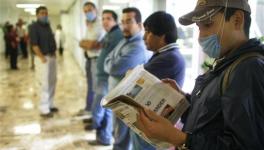Puducherry Shuts Schools to Control Swine Flu, Tamil Nadu Hasn't
Representational use only.Image Courtesy: NDTV
Over the past few days, there has been an uproar over the increasing H1N1 or swine flu cases in Tamil Nadu and Puducherry.
In the wake of rising cases of fever and the flu among children, the School Education Department declared a holiday for students from Classes I to VIII in Puducherry and Karaikal from September 17 to 25.
Meanwhile, despite pressure from leaders such as the former chief minister of Tamil Nadu O Panneerselvam and Pattali Makkal Katchi (PMK) president Dr Anbumani Ramadoss, the state government has decided not to shut schools to control virus transmission.
Instead, the Tamil Nadu government organised fever camps at 1,000 locations, including 100 in Chennai, from September 21. This is a precautionary measure to diagnose fever, provide necessary treatment and prevent the surge
'IMMUNITY DEBT' IN CHILDREN
Health experts say the surge in swine flu cases among children is because they were not exposed to these infections due to the COVID-19 lockdown. They are once again exposed to more infections since schools started functioning.
Former Global Coordinator of the People's Health Movement, Dr Sundararaman, said, "It has come out as a school children epidemic due to a phenomenon called the "immunity debt"."
He said, "In the last two years of pandemic lockdown, children were not exposed to the usual levels of circulating infections, especially the seasonal flu. So, this year when the season arrived, there was a build-up of non-immune or susceptible children."
"It spreads like an epidemic, going on till children catch up to the usual stable immunity levels," he added.
"This outbreak of fever is largely due to H1N1 or swine flu. A small number, less than 10%, is due to respiratory syncytial virus (RSV) and Covid. This fever is like the typical seasonal flu but a bit more severe," said Sundararaman. But, "This will pass," he added.
TO SHUT SCHOOLS OR NOT?
Given the long COVID-19-induced pandemic and the accompanying lockdowns, the discontinuity of education has had a negative impact on school children. It has not been long since schools resumed the pre-pandemic academic calendar and the full-time physical classes.
“This request for shutdown might initially be for a short time, but it is a slippery slope, and we could end up shutting down for a long time,” said M Karuna, a social audit consultant working on health.
"My question would be what it is now compared with the pre-COVID time," he said warily of shutting schools.
An emergency report of the School Children's Online and Offline Learning (SCHOOL) survey, which took place in August 2021 in 15 states and UTs, shows the catastrophic consequences of prolonged school closure in the last year and a half. In rural areas, only 8% of sample children study online regularly, and 37% do not.
“Unless there is a clear and present danger, schools should not be shut,” said Karuna.
Sundararaman said, "The government has taken correct action in Pondicherry. The schools must close if the number of new cases is too much for hospitals to deal with."
However, he added, "But if they can cope, then it does not make sense to shut schools. Over time, the children will catch the bug, which is not such a bad thing."
CASE COUNT
Approximately 800 outpatient and in-patient paediatric fever cases were reported in Puducherry and Karaikal hospitals on September 21.
On September 20, Tamil Nadu had 368 H1N1 active influenza cases; 264 were treated in private hospitals, 89 were treated at home, and only 15 were admitted to government facilities.
"Even though we've been saying that there is no need to panic, the issue is being politicised seeking school holidays," stated Tamil Nadu health minister Ma Subramanian.
Subramanian said the infection percentage, normally at 1%, will jump to 1.5% during the monsoon season. He added that there was nothing to worry about.
Get the latest reports & analysis with people's perspective on Protests, movements & deep analytical videos, discussions of the current affairs in your Telegram app. Subscribe to NewsClick's Telegram channel & get Real-Time updates on stories, as they get published on our website.




















